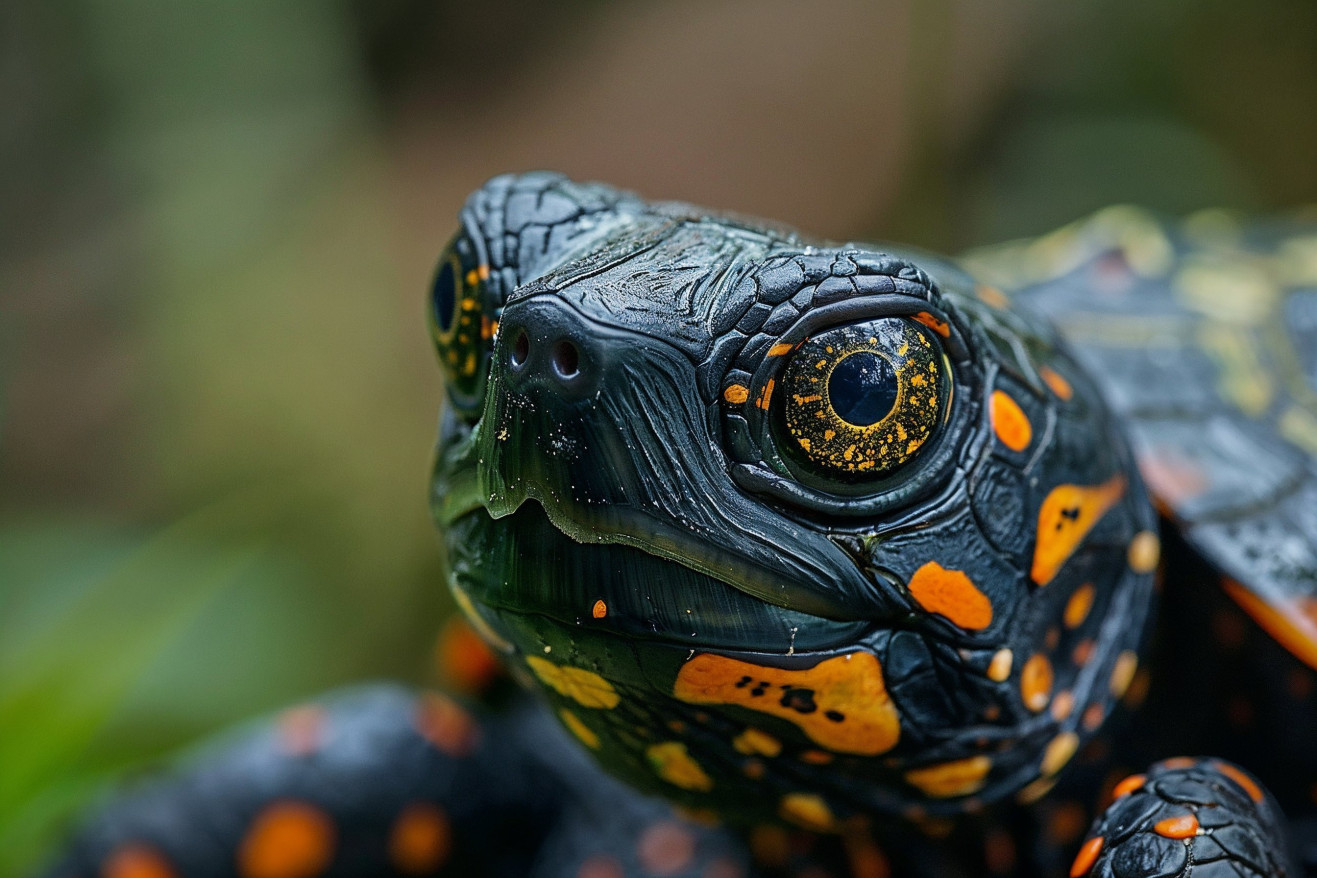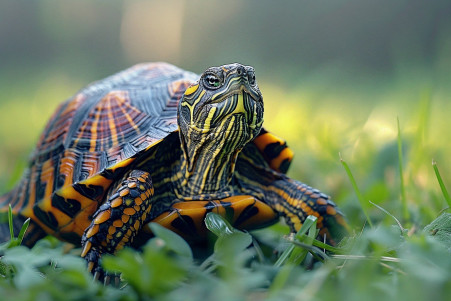How Smart Are Turtles? An Investigation Into Turtle Intelligence
24 May 2024 • Updated 23 May 2024

With their enduring popularity, the topic of turtle intelligence provides an interesting look at what we know about how these animals think. While turtles may appear to be relatively simple animals, studies have shown that they have advanced problem-solving abilities, complex long-term memory, and even the ability to create cognitive maps—all signs of intelligence.
In this article, we'll take a closer look at recent research in animal cognition and evolutionary biology to better understand the many facets of turtle intelligence. From their ability to navigate to their use of tools, social interactions, and more, you'll walk away with a deeper understanding of the many ways these ancient, slow-moving representatives of the animal kingdom demonstrate their intelligence.
Do turtles have higher-level thinking skills?
Cognitive Maps: Exploring the Depths of Turtle Intelligence
The cognitive map, a mental representation of spatial relationships between locations, is a concept generally accepted in mammals and birds. However, recent research suggests this ability may extend to non-avian reptiles like turtles. A study examined the movement patterns of semiaquatic Eastern painted turtles (Chrysemys picta) before, during, and after pharmacological disruption of their spatial memory.
Before treatment, turtles moved linearly along traditional migratory routes. After treatment, their movements became highly tortuous, deviating hundreds of meters from these paths. Once recovered, turtles returned directly to their routes using linear movements, suggesting deliberate navigation. The researchers argue these observations are consistent with turtles using a cognitive map.
In another study, researchers found similar results - turtles moved linearly on routes before treatment but became disoriented after spatial memory disruption. They concluded this robust behavioral pattern indicates cognitive map use by turtles, urging further investigation into such abilities in non-model taxa like non-avian reptiles.
If turtles possess cognitive maps, it could explain their remarkable navigation skills and ability to adapt to rapidly changing environments, as highlighted by research on turtles using map-like, relational strategies. Understanding turtle spatial cognition may provide insights into the evolution of intelligence across vertebrates. These findings challenge assumptions about reptilian intelligence, suggesting the need to expand our understanding of cognitive capabilities in diverse taxa.
Sensory Perception: How Turtles Use Their Senses to Understand the World
Turtles, especially sea turtles, have a wide range of senses that have evolved to help them survive in the water. According to SeaWorld, sea turtles have good vision underwater, including the ability to see in color and ultraviolet light, which may help them find food, avoid predators, and navigate their surroundings.
Turtles’ sense of hearing is also specialized, and they can hear low-frequency sounds and vibrations, which may help them find the beaches where they nest and communicate with other turtles. Britannica notes that turtles have a unique hearing system that includes a tympanic membrane and ossicular chain that makes them especially sensitive to low-frequency sounds below 500 Hz.
Turtles also have a good sense of smell, which SeaWorld says helps them find food in the ocean’s murky waters. And turtles can sense the Earth's magnetic field, which The State of the World's Sea Turtles says helps them navigate and migrate over long distances.
All of these senses are highly specialized and help turtles understand their environment and their place in it. This, in turn, helps explain their impressive cognitive abilities and intelligence. When you add in their ability to learn and remember spatial information, it’s clear that turtles are much more complex animals than they may seem at first glance.
Turtles' Learning and Cognitive Development
In the last few years, several studies have revealed turtles' impressive learning and cognitive abilities throughout their lives. For example, in her dissertation, Karen Marie Davis showed that turtles can learn instrumental tasks quickly and remember them for years, indicating that they have highly developed long-term memory.
Davis also demonstrated social learning in turtles, showing that turtles could learn by watching other turtles perform a task that resulted in a food reward. This is the first experimental evidence of social learning in turtles and contradicts earlier beliefs about turtles' cognitive abilities.
In addition, research has shown that giant tortoises can learn new tasks quickly and remember them for up to nine years, emphasizing the importance of the early critical period in turtles' cognitive development.
These studies indicate that turtles' learning and memory abilities are much more advanced than previously believed and show that there is a wide range of cognitive abilities within the reptile class. As we learn more about the details of turtle intelligence, our understanding of these ancient animals will undoubtedly grow.
Comparative Cognition: How Smart Are Turtles?
Research on the range of cognitive abilities within the turtle order has shown that there are some differences and similarities between species. For example, a recent study on the quantitative discrimination abilities of freshwater turtles demonstrated that the Asian freshwater turtle Mauremys sinensis could discriminate between quantities of 9 and 10, a level of performance that was similar to some warm-blooded animals.
Meanwhile, a study that compared the invasive red-eared slider (Trachemys scripta elegans) to the native stripe-necked turtle showed that the slider had a higher degree of cognitive flexibility, as evidenced by less of a drop in performance as the difficulty of the quantity discrimination tasks increased. The researchers suggested that this cognitive flexibility may be one reason why the red-eared slider has been able to outcompete native turtle species in its environment.
A number of factors, including evolutionary adaptations and environmental pressures, have likely contributed to the range of cognitive abilities seen in turtles. As noted in a study, it is important to understand the link between reptile cognition and ecology, which will require more in-depth research into cognitive abilities across the reptile order. This, in turn, could help us better understand the evolution of intelligence in vertebrates.
Reptilian Cognition: Breaking Stereotypes
The idea that reptiles are cognitively simple, unintelligent animals is increasingly being challenged by a growing body of research that is breaking down stereotypes. As the New York Times notes, reptiles were once considered "instinct machines" with limited cognitive abilities. Yet recent research has shown that reptile brains are more complex than previously believed.
One important finding is that reptiles, birds, and mammals all evolved from a common ancestor 280 million years ago, as discussed in this paper. This means that some advanced cognitive abilities may have evolved much earlier than previously thought, or may have evolved in multiple lineages. By investigating reptilian cognition from an ecological and evolutionary perspective, as outlined in this paper, researchers have started to build a more complete picture of the conserved mechanisms that underlie cognitive function.
Environmental pressures and social interactions may have driven the evolution of complex cognition in reptiles, as reviewed in this paper. Understanding the range of reptilian cognitive abilities can help researchers better understand the evolution of intelligence in vertebrates more generally, and in doing so, challenge the stereotypes about the cognitive limitations of "cold-blooded" animals.
Conclusion: Expanding Our Understanding of Reptilian Intelligence
The studies of turtle cognition have upended our assumptions about the cognitive abilities of reptiles. Turtles have been shown to possess a wide range of cognitive skills, from the use of cognitive maps to navigate their environments to specialized sensory systems that enable them to interact with the world in complex ways.
This work underscores the importance of understanding reptile cognition and how it can provide new perspectives on the evolution of intelligence across different taxa. It also shows that turtles have advanced learning and memory skills, and may even have the ability to socially learn and adapt to rapidly changing environments.
Perhaps most importantly, the insights into turtle cognition have implications for our understanding of reptiles more broadly. The historical view of reptiles as simple, unintelligent animals is being challenged by the growing body of evidence that shows that reptiles have a wide range of cognitive abilities. Further study in this area has the potential to provide new insights into the evolution of intelligence and the amazing abilities of these ancient, resilient animals.
By recognizing the intelligence of turtles and other reptiles, we can expand our understanding of the natural world and the amazing abilities of the creatures that inhabit it. This understanding may also help inform more effective conservation efforts to protect these animals and their habitats. While the work to expand our understanding of reptilian intelligence is ongoing, the research conducted to date has already upended our assumptions and opened up new lines of inquiry.


